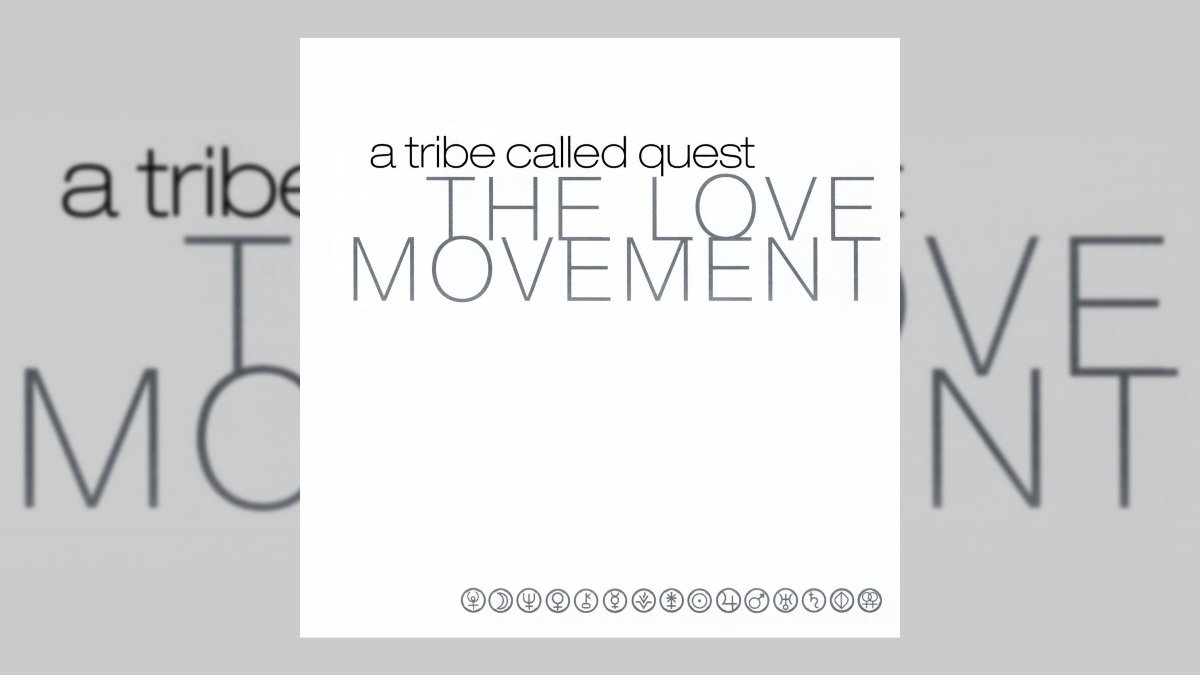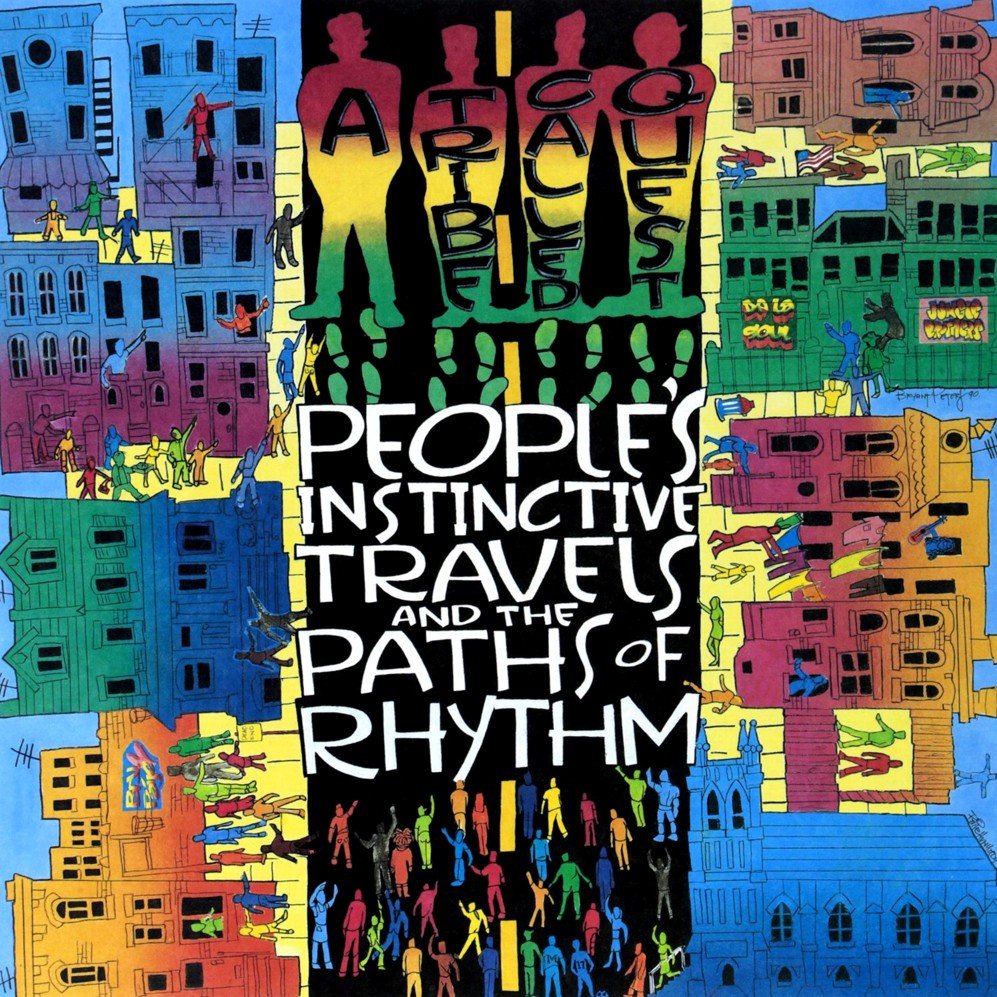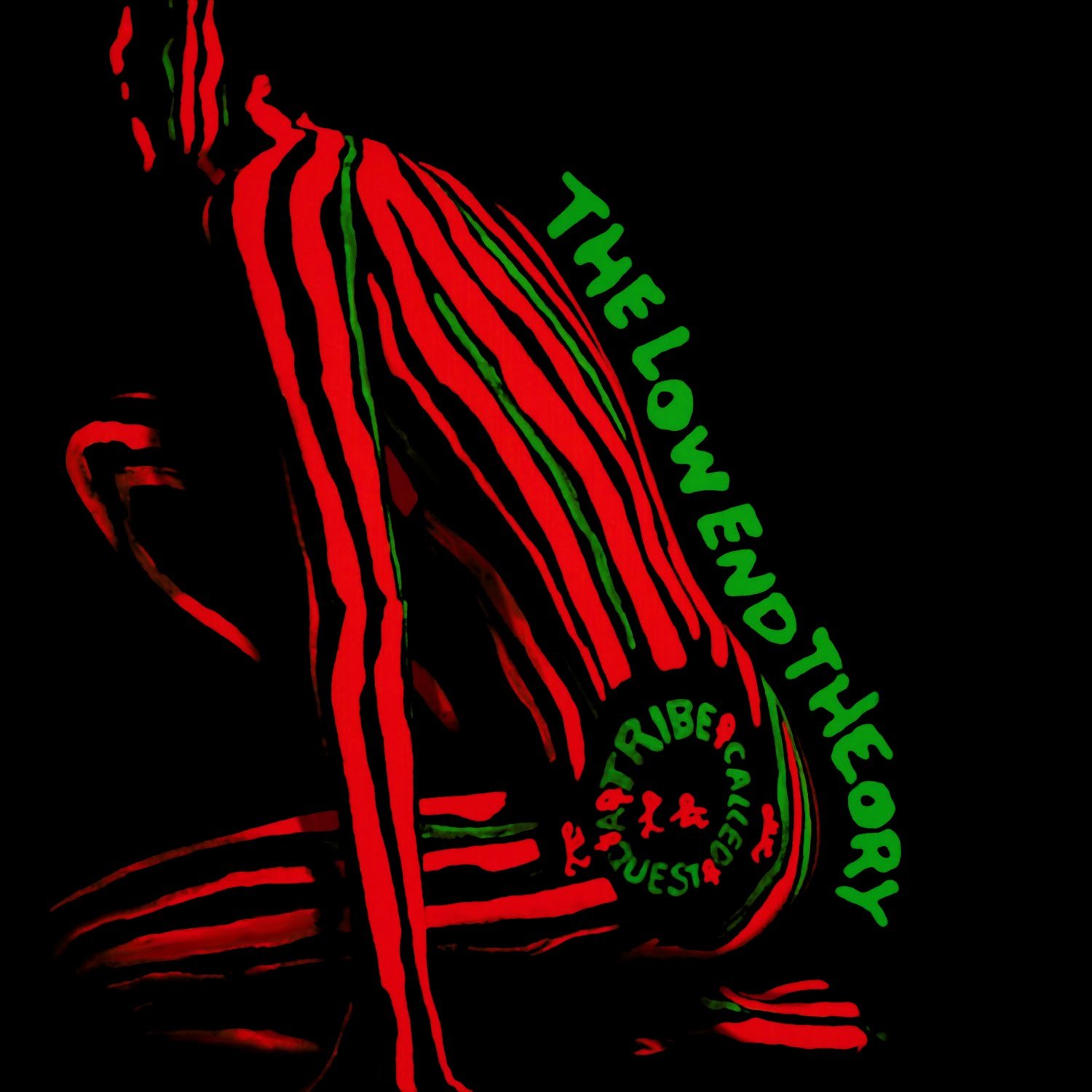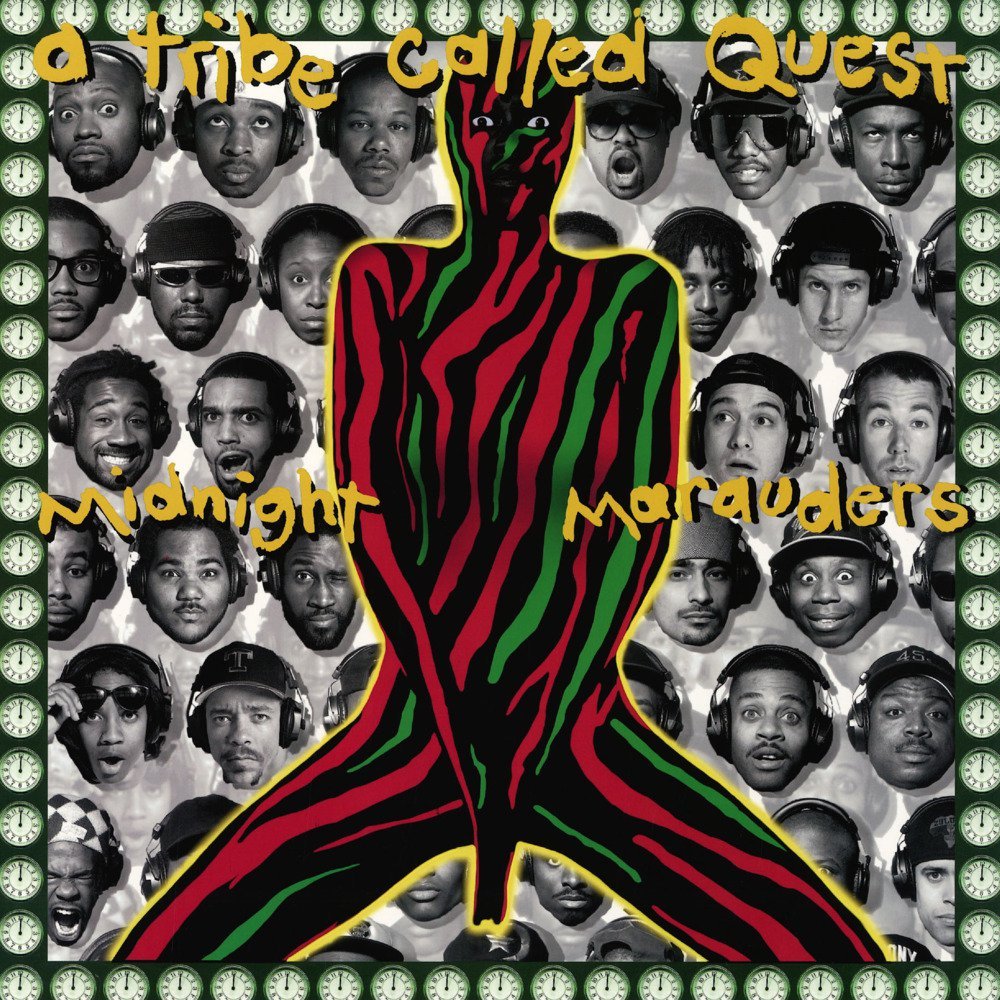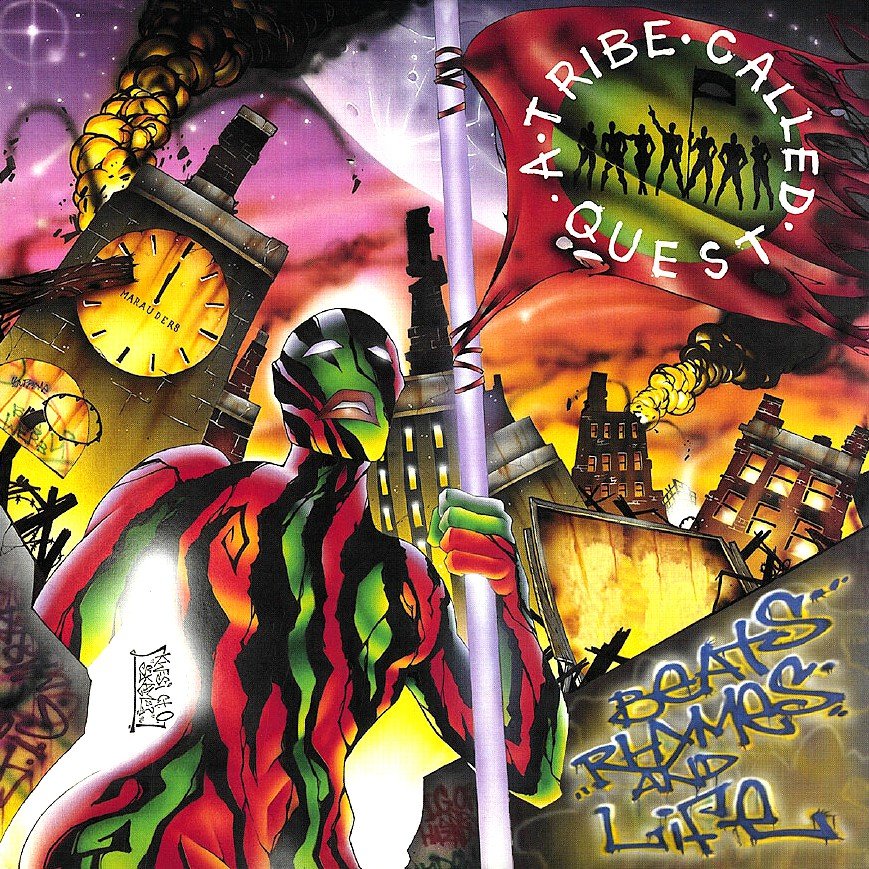Happy 25th Anniversary to A Tribe Called Quest’s fifth studio album The Love Movement, originally released September 29, 1998.
From 1990 to 1993, the hip-hop collective A Tribe Called Quest ruled with an iron hand. Comprised of native New Yorkers Jonathan “Q-Tip” Davis, Malik “Phife Dawg” Taylor, Ali Shaheed Muhammad and reservist Jarobi White, the group released three albums in that four-year expanse that became inevitable classics of their era. On these long players, A Tribe Called Quest utilized an expressive blend of classic jazz and contemporary urban sonics with erudite flows—all of it set a new benchmark for the hip-hop genre.
In the brief interim between their third (1993’s Midnight Marauders) and fourth (1996’s Beats, Rhymes and Life) sets, A Tribe Called Quest underwent a host of personal and professional changes. These changes ultimately altered the course of the trio’s trajectory and shaped their fourth and fifth records. The shifts were subtle and major: Q-Tip converted to the Islam faith; Phife Dawg moved to Atlanta, Georgia; Ali began (production) moonlighting on other projects; additional creative input was fielded from Dexter “Consequence” Mills Jr. and James “Jay Dee” Yancey. The latter element took further form as “The Ummah.”
Borrowing its name from the Arabic word for “community,” the mini-production unit’s core roster consisted of Q-Tip, Ali, and Jay Dee. In addition to handling the production overhead for Beats, Rhymes and Life and The Love Movement, they contracted their services out for a range of acts that included Janet Jackson, The Brand New Heavies, Whitney Houston, and Jon B. This redistribution of creative capital sent shockwaves through the inner workings of A Tribe Called Quest, and the subsequent tension left an indelible mark on Beats, Rhymes and Life.
When unleashed in July 1996, Beats, Rhymes and Life met with mixed opinions from both fans and critics. And while it initially charged out of the gate commercially, it eventually leveled out prematurely. Sonically, despite the fraught nature around its construction, Beats, Rhymes and Life was a brave step forward. A semi-continuance of the jazz-flecked arranging of their preceding efforts, A Tribe Called Quest (under The Ummah’s direction) swapped out the fleshy funk of those LPs with a tighter, occasionally electronic vibe.
Sensing that the darker hues of Beats, Rhymes and Life might have isolated them from audiences, their fifth outing The Love Movement pursued a lighter, but still thoughtful touch—especially regarding its songwriting. Clocking in at 15 tracks on the standard pressing—and 21 tracks on the special edition that sported several classic Tribe tracks, albeit remixed—almost all of them were solid party jams. Celebratory (“The Love”), romantic (“Find A Way”) and playfully boastful (“Start It Up,” “Pad & Pen”), The Love Movement floats on its own cool, lyrical cloud.
Listen to the Album:
Q-Tip and Phife Dawg’s rhymes—whether operating parallel to each other or jovially sparring—are in peak form per usual. Q-Tip is his ever handsome, hypnotic self. Phife Dawg provides a pleasant contrast with his own equally fetching rough-edged charm. See the cunning and succinct boogie of “Da Booty” for details.
Featured guests are plentiful. Fellow colleagues of the period step in and include (but aren’t limited to) Busta Rhymes, Redman, Noreaga, and Mos Def. Resulting numbers like “Rock Rock Y’all” come off crowded given that Q-Tip and Phife Dawg can carry The Love Movement on their own. But, collaboration is one of the traditional tenets of hip-hop and it’s likely that the intended audiences were unfazed by the guests along for the ride. What’s most important is the chemistry between the lead Tribe emcees and how it interfaces with the music itself.
The Ummah once again create their own modern, musical pulse across the expansion of The Love Movement. And while The Ummah splits between three individuals, one cannot deny that it is Ali’s singular sensibility of organic and inorganic sound cross-pollination that shines here. This component had always been central to the threesome’s previous four recordings and that is true for The Love Movement too.
An example includes the relaxed, but impactful swing of “Like it Like That.” Its synths are warm, bright and infectious, pairing delightfully with what can only be described as a guitar chucking loop put through a polite electronic filter, which doesn’t completely strip the instrument of its natural feel, rather it accentuates it. Then, there is an imaginative instrumental, “4 Moms,” that spotlights jazz guitarist Chalmers “Spanky” Alford, who flexes over the languid, electro-urban groove with ease. It’s this envious meticulousness toward balancing its organic and inorganic parts that lend the album its taut, compelling presence. It also assists in making The Love Movement a complementary partner to Beats, Rhymes and Life.
Despite the conscious mood reversal from the antecedent long player, the birthing process for The Love Movement remained contentious. Festering animosity about the furtherance of The Ummah’s artistic authority with A Tribe Called Quest’s writing and recording activities promised an inexorable flashpoint.
One month before the September 29, 1998 drop date for The Love Movement on the Jive Records label, A Tribe Called Quest shockingly announced their separation. Only one commercial single was issued from The Love Movement in “Find A Way,” which left the album in something of a lurch. Nevertheless, it still managed to achieve gold certification for 500,000 units sold in the United States.
Enjoying this article? Click/tap on the album covers to explore more about A Tribe Called Quest:
The ensuing years saw an influx of solo and side affairs, a few live performance reunions, one lauded film documentary and additional conflicts before their sixth and final album We Got It from Here…Thank You 4 Your Service appeared in 2016. The critically acclaimed collection reunited Phife Dawg with his Tribe brothers before his tragic death due to complications from diabetes earlier that same year.
In retrospect, The Love Movement kept A Tribe Called Quest on the ever-changing front lines of hip-hop to advance the diverse musicality of the artform. Obviously, some of this can be attributed to the contributions of J Dilla, who was seminal in reworking the alternative hip-hop landscape of the early 2000s prior to his own untimely passing in 2006. But, The Love Movement on its own minimalist merit remains unique in the A Tribe Called Quest canon.
Q-Tip, Phife Dawg and Ali Shaheed Muhammad managed to craft another offering full of brains, brawn and heart despite any internal problems and conquer the considerable challenge of matching the excellence of their previous discography entries—the record was indeed a movement all its own.
LISTEN:
Editor's note: this anniversary tribute was originally published in 2018 and has since been edited for accuracy and timeliness.

